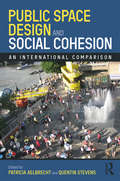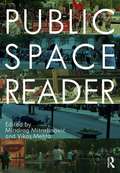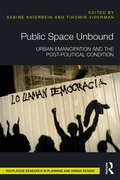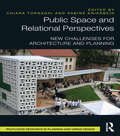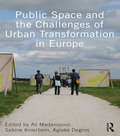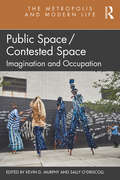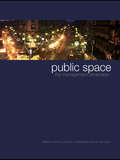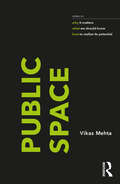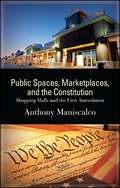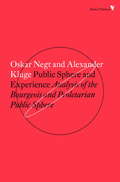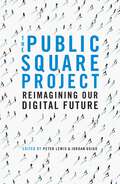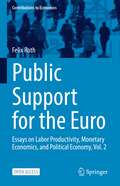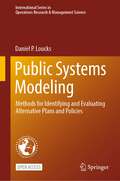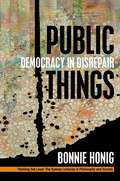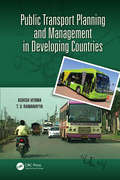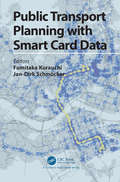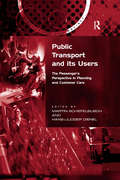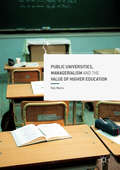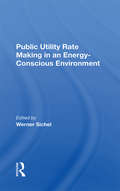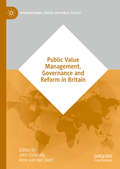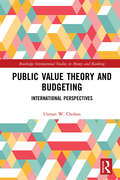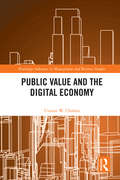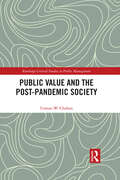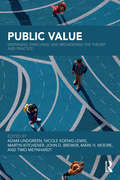- Table View
- List View
Public Space Design and Social Cohesion: An International Comparison
by Patricia Aelbrecht Quentin StevensSocial cohesion is often perceived as being under threat from the increasing cultural and economic differences in contemporary cities and the increasing intensity of urban life. Public space, in its role as the main stage for social interactions between strangers, clearly plays a role in facilitating or limiting opportunities for social cohesion. But what exactly is social cohesion, how is it experienced in the public realm, and what role can the design of city spaces have in supporting or promoting it? There are significant knowledge gaps between the social sciences and design disciplines and between academia and practice, and thus a dispersed knowledge base that currently lacks nuanced insight into how urban design contributes to social integration or segregation. This book brings together scholarly knowledge at the intersection of public space design and social cohesion. It is based on original scholarly research and a depth of urban design practice, and analyses case studies from a variety of cities and cultures across the Global North and Global South. Its interdisciplinary, cross-cultural analysis will be of interest to academics, students, policymakers and practitioners engaged with a range of subject areas, including urban design, urban planning, architecture, landscape, cultural studies, human geography, social policy, sociology and anthropology. It will also have significant appeal to a wider non-academic readership, given its topical subject matter.
Public Space Reader
by Mitrašinović Miodrag Mehta VikasRecent global appropriations of public spaces through urban activism, public uprising, and political protest have brought back democratic values, beliefs, and practices that have been historically associated with cities. Given the aggressive commodification of public re- sources, public space is critically important due to its capacity to enable forms of public dis- course and social practice which are fundamental for the well-being of democratic societies. Public Space Reader brings together public space scholarship by a cross-disciplinary group of academics and specialists whose essays consider fundamental questions: What is public space and how does it manifest larger cultural, social, and political processes? How are public spaces designed, socially and materially produced, and managed? How does this impact the nature and character of public experience? What roles does it play in the struggles for the just city, and the Right to The City? What critical participatory approaches can be employed to create inclusive public spaces that respond to the diverse needs, desires, and aspirations of individuals and communities alike? What are the critical global and comparative perspectives on public space that can enable further scholarly and professional work? And, what are the futures of public space in the face of global pandemics, such as COVID-19? The readers of this volume will be rewarded with an impressive array of perspectives that are bound to expand critical understanding of public space.
Public Space Unbound: Urban Emancipation and the Post-Political Condition
by Sabine Knierbein Tihomir VidermanThrough an exploration of emancipation in recent processes of capitalist urbanization, this book argues the political is enacted through the everyday practices of publics producing space. This suggests democracy is a spatial practice rather than an abstract professional field organized by institutions, politicians and movements. Public Space Unbound brings together a cross-disciplinary group of scholars to examine spaces, conditions and circumstances in which emancipatory practices impact the everyday life of citizens. We ask: How do emancipatory practices relate with public space under ‘post-political conditions’? In a time when democracy, solidarity and utopias are in crisis, we argue that productive emancipatory claims already exist in the lived space of everyday life rather than in the expectation of urban revolution and future progress.
Public Space and Relational Perspectives: New Challenges for Architecture and Planning
by Sabine Knierbein Chiara TornaghiTraditional approaches to understand space tend to view public space mainly as a shell or container, focussing on its morphological structures and functional uses. That way, its ever-changing meanings, contested or challenged uses have been largely ignored, as well as the contextual and on-going dynamics between social actors, their cultures, and struggles. The key role of space in enabling spatial opportunities for social action, the fluidity of its social meaning and the changing degree of "publicness" of a space remain unexplored fields of academic inquiry and professional practice. Public Space and Relational Perspectives offers a different understanding of public spaces in the city. The aim of the book is to (re)introduce the lived experiences in public life into the teaching curricula of those academic disciplines which deal with public space and the built environment, such as architecture, planning and urban design, as well as the social sciences. The book presents conceptual, practical and research challenges and brings together findings from activists, practitioners and theorists. The editors provide eight educational challenges that educators can endorse when training future practitioners and researchers to accept and to engage with the social relations that unfold in and through public space. Cover image: KARO*
Public Space and the Challenges of Urban Transformation in Europe
by Sabine Knierbein Ali Madanipour Aglaée DegrosEuropean cities are changing rapidly in part due to the process of de-industrialization, European integration and economic globalization. Within those cities public spaces are the meeting place of politics and culture, social and individual territories, instrumental and expressive concerns. Public Space and the Challenges of Urban Transformation in Europe investigates how European city authorities understand and deal with their public spaces, how this interacts with market forces, social norms and cultural expectations, whether and how this relates to the needs and experiences of their citizens, exploring new strategies and innovative practices for strengthening public spaces and urban culture. These questions are explored by looking at 13 case studies from across Europe, written by active scholars in the area of public space and organized in three parts: strategies, plans and policies multiple roles of public space and everyday life in the city. This book is essential reading for students and scholars interested in the design and development of public space. The European case studies provide interesting examples and comparisons of how cities deal with their public space and issues of space and society.
Public Space, Media Space
by Chris Berry Rachel Moore Janet HarbordPublic Space, Media Space asks how media saturation are transforming public space and our experience of it. From the role of graffiti and Youtube videos of street art in the Cairo revolution, to OOH (Out of Home) advertising, the book is diverse in its approach and global in its coverage.
Public Space/Contested Space: Imagination and Occupation (The Metropolis and Modern Life)
by Kevin D. MurphyIt is not possible to be alive today in the United States without feeling the influence of the political climate on the spaces where people live, work, and form communities. Public Space/Contested Space illustrates the ways in which creative interventions in public space have constituted a significant dimension of contemporary political action, and how this space can both reflect and spur economic and cultural change. Drawing insight from a range of disciplines and fields, the essays in this volume assess the effectiveness of protest movements that deploy bodies in urban space, and social projects that build communities while also exposing inequalities and presenting new political narratives. With sections exploring the built environment, artists, and activists and public space, the book brings together the diverse voices to reveal the complexities and politicization of public space within the United States. Public Space/Contested Space provides a significant contribution to an understudied dimension of contemporary political action and will be a resource to students of urban studies and planning, architecture, sociology, art history, and human geography.
Public Space: The Management Dimension
by Matthew Carmona Claudio De Magalhães Leo HammondIn both the UK and the US there is a sense of dissatisfaction and pessimism about the state of urban environments, particularly with the quality of everyday public spaces. Explanations for this have emphasized the poor quality of design that characterizes many new public spaces; spaces that are dominated by parking, roads infrastructure, introspective buildings, a lack of enclosure and a poor sense of place, and which in different ways for different groups are too often exclusionary. Yet many well designed public spaces have also experienced decline and neglect, as the services and activities upon which the continuing quality of those spaces have been subject to the same constraints and pressures for change as public services in general. These issues touch upon the daily management of public space, that is, the coordination of the many different activities that constantly define and redefine the characteristics and quality of public space. This book draws on three empirical projects to examine the questions of public space management on an international stage. They are set within a context of theoretical debates about public space, its history, contemporary patterns of use and changing nature in western society, and about the new management approaches that are increasingly being adopted.
Public Space: notes on why it matters, what we should know, and how to realize its potential
by Vikas MehtaPublic Space: notes on why it matters, what we should know, and how to realize its potential journeys a vast territory and presents a panoramic view of public space—an understanding from numerous disciplines—under one cover in an incisive and concise manner. As a dialogue between the social-political and the material-physical, the book brings together the key ideas that encompass the social, political, and physical issues in the making and experience of public space. The book is at the same time a primer and a progressive text. It makes the case for public space, digs deep into understanding what public space is, followed by three sections that present the inherent paradoxes, the possibilities, and propositions for a more meaningful public space. The book presents ideas in concise and approachable ways—from established tenets to new propositions—that are constructive and thought-provoking, with many that will challenge the reader’s preconceived notions. Students and scholars in the built environment disciplines and social sciences, public space managers, public and private sector practitioners, and civic leaders, but also residents who want to better understand and make an impact in their communities and cities will find Public Space to be a valuable resource.
Public Spaces, Marketplaces, and the Constitution: Shopping Malls and the First Amendment (SUNY series in American Constitutionalism)
by Anthony ManiscalcoIn spite of their public attractions and millions of visitors, most shopping malls are now off-limits to free speech and expressive activity. The same may be said about many other public spaces and marketplaces in American cities and suburbs, leaving scholars and other observers to wonder where civic engagement is lawfully permitted in the United States. In Public Spaces, Marketplaces, and the Constitution, Anthony Maniscalco draws on key legal decisions, social theory, and urban history to demonstrate that public spaces have been split apart from First Amendment protections, while the expression of political ideas has been excluded from privately owned, publicly accessible malls. Today, the traditional indoor suburban shopping mall, that icon of modern American capitalism and culture, is being replaced by outdoor retail centers. Yet the law and courts have been slow to catch up. Maniscalco argues that scholars, students, and the public must confront these innovations in commercial design and consumer practices, as well as what they portend for contemporary metropolitan America and its civic spaces.
Public Sphere and Experience
by Alexander Kluge Oskar Negt Miriam HansenThe "public sphere" is a key concept in political discourse, designating a space for political action. But is this a single authoritative and universal space in which various positions compete for recognition, or does it consist of multiple local spaces spread over diverse collectivities? In Kluge and Negt's groundbreaking book they examine the material conditions of experience in an arena that had previously figured only as an abstract term: the media of mass and consumer culture.With a new, up-to-date introduction from Alexander Kluge.From the Trade Paperback edition.
Public Square Project: Reimagining Our Digital Future
by Peter Lewis Jordan GuiaoWestern democracy has always been anchored by the idea of a public space where people gather to share ideas, mediate difference and make sense of the world. When Facebook blocked Australian users from viewing or sharing news in 2021, it sounded the alarm worldwide on our growing reliance on global tech companies to fulfil this critical role in a digital world. Facebook's hostile act, constituting a very real threat to participatory democracy, was a direct response to government attempts to regulate Big Tech's advertising monopoly and to mediate its impact on public interest journalism. The conflict sparked a new sense of urgency around the growing movement to imagine alternative digital spaces that operate in the public interest rather than simply for a commercial bottom line. Can we create sustainable media models to help us tackle society's problems? Can we engender a civic platform built on facts and civility? Can we control the power of our data and use it to promote the common good? The Public Square Project draws together leading tech scholars, industry experts, writers and activists to chart a path towards a public square worthy of the name.
Public Support for the Euro: Essays on Labor Productivity, Monetary Economics, and Political Economy, Vol. 2 (Contributions to Economics)
by Felix RothThe long-term sustainability of the euro and the Economic and Monetary Union (EMU) depends heavily on their ability to attract widespread public support. The support shown for the euro throughout its first two decades has helped to shield it against populist attempts at the national level to dismantle the common currency. It has granted political legitimacy to the presidents of the European Central Bank to do “whatever it takes” whenever a serious crisis has threatened the viability of the euro.Public Support for the Euro is the second of two open-access volumes presenting a selection of the author's essays on Labor Productivity, Monetary Economics, and Political Economy. This second volume brings together eleven of the author's essays, selected with the aim of providing an overview of his research to date on public support for and the economics and political economy of the euro and EMU.
Public Systems Modeling: Methods for Identifying and Evaluating Alternative Plans and Policies (International Series in Operations Research & Management Science #318)
by Daniel P. LoucksThis is an open access book discusses readers to various methods of modeling plans and policies that address public sector issues and problems. Written for public policy and social sciences students at the upper undergraduate and graduate level, as well as public sector decision-makers, it demonstrates and compares the development and use of various deterministic and probabilistic optimization and simulation modeling methods for analyzing planning and management issues. These modeling tools offer a means of identifying and evaluating alternative plans and policies based on their physical, economic, environmental, and social impacts. Learning how to develop and use the mathematical modeling tools introduced in this book will give students useful skills when in positions of having to make informed public policy recommendations or decisions.
Public Things: Democracy in Disrepair (Thinking Out Loud)
by Bonnie HonigIn the contemporary world of neoliberalism, efficiency is treated as the vehicle of political and economic health. State bureaucracy, but not corporate bureaucracy, is seen as inefficient, and privatization is seen as a magic cure for social ills. In Public Things: Democracy in Disrepair, Bonnie Honig asks whether democracy is possible in the absence of public services, spaces, and utilities. In other words, if neoliberalism leaves to democracy merely electoral majoritarianism and procedures of deliberation while divesting democratic states of their ownership of public things, what will the impact be?Following Tocqueville, who extolled the virtues of “pursuing in common the objects of common desires,” Honig focuses not on the demos but on the objects of democratic life. Democracy, as she points out, postulates public things—infrastructure, monuments, libraries—that citizens use, care for, repair, and are gathered up by. To be “gathered up” refers to the work of D. W. Winnicott, the object relations psychoanalyst who popularized the idea of “transitional objects”—the toys, teddy bears, or favorite blankets by way of which infants come to understand themselves as unified selves with an inside and an outside in relation to others. The wager of Public Things is that the work transitional objects do for infants is analogously performed for democratic citizens by public things, which press us into object relations with others and with ourselves.Public Things attends also to the historically racial character of public things: public lands taken from indigenous peoples, access to public goods restricted to white majorities. Drawing on Hannah Arendt, who saw how things fabricated by humans lend stability to the human world, Honig shows how Arendt and Winnicott—both theorists of livenesss—underline the material and psychological conditions necessary for object permanence and the reparative work needed for a more egalitarian democracy.
Public Transport Planning and Management in Developing Countries
by Ashish Verma T.V. RamanayyaDeveloping Countries Have Different Transportation Issues and Requirements Than Developed CountriesAn efficient transportation system is critical for a country's development. Yet cities in developing countries are typically characterized by high-density urban areas and poor public transport, as well as lack of proper roads, parking facilities, road
Public Transport Planning with Smart Card Data
by Fumitaka Kurauchi Jan-Dirk SchmöckerCollecting fares through "smart cards" is becoming standard in most advanced public transport networks of major cities around the world. Travellers value their convenience and operators the reduced money handling fees. Electronic tickets also make it easier to integrate fare systems, to create complex time and space differentiated fare systems, and to provide incentives to specific target groups. A less-utilised benefit is the data collected through smart cards. Records, even if anonymous, provide for a much better understanding of passengers’ travel behaviour as current literature shows. This information can also be used for better service planning. <P><P>Public Transport Planning with Smart Card Data handles three major topics: how passenger behaviour can be estimated using smart card data, how smart card data can be combined with other trip databases, and how the public transport service level can be better evaluated if smart card data is available. The book discusses theory as well as applications from cities around the world and will be of interest to researchers and practitioners alike who are interested in the state-of-the-art as well as future perspectives that smart card data will bring.
Public Transport and its Users: The Passenger's Perspective in Planning and Customer Care (Transport and Society)
by Hans-Liudger DienelPublic transport is essential to the quality of life of its passengers, both as a means to move around but also to achieve a sustainable environment. However, the passenger's position as a customer is weakened by the dominance of monopolies, regulation and political influence in our public transport systems. This book is one of the first to examine strategies for the representation of user interests in public transport from a variety of perspectives. The authors review approaches to integrating the passengers' views in the planning process and to protecting their interests in operations and customer care across a range of European countries, including Austria, Czech Republic, France, Germany, Italy, the Netherlands, Sweden, Switzerland, the UK and EU policies. The book presents the conclusions of this research and examples of good practice. In this respect it will provide useful guidance for policy makers, stakeholder organizations and planners, as well as transport researchers.
Public Universities, Managerialism and the Value of Higher Education (Palgrave Critical University Studies)
by Rob WattsThis book provides a rigorous examination into the realities of the current university system in Britain, America and Australia. The radical makeover of the higher education system which began in the 1980s has conventionally been understood as universities being transformed into businesses which sell education and research in a competitive market. This engaging and provocative book argues that this is not actually the case. Drawing on lived experience, Watts asserts that the reality is actually a consequence of contradictory government policy and new public management whose exponents talk and act ‘as-if’ universities have become businesses. The result of which is ‘market crazed governance’, whereby universities are subjected to expensive rebranding and advertising campaigns and the spread of a toxic culture of customer satisfaction surveys which ask students to evaluate their teachers and what they have learned, based on government ‘metrics’ of research ‘quality’.This has led to a situation where not only the normal teacher-student relationship is inverted, academic professional autonomy is eroded and many students are short-changed, but where universities are becoming places whose leaders are no longer prepared to tell the truth and too few academics are prepared to insist they do. An impassioned and methodical study, this book will be of great interest to academics and scholars in the field of higher education and education policy.
Public Utility Rate Making In An Energy-Conscious Environment
by Werner SichelThis collection of papers by some of America's most respected scholars and practitioners in the field of public utility regulation provides an up-to-date analysis of urgent problems and proposed remedies concerning the electricity and natural gas industries. The authors--two academic economists, a professor of law, a practicing attorney and consume
Public Value Management, Governance and Reform in Britain (International Series on Public Policy)
by John Connolly Arno van der ZwetThis book examines developments in governance reform in Britain, with a particular focus on the period since 2010. We argue that the experiences of the past decade mean that public value-based ideas are required to inform governance reform for the coming years. This needs to be prioritised due to the twin challenges of managing the aftermath of Brexit and navigating through the recovery phase of the COVID-19 pandemic. The volume outlines key themes, issues and debates relevant to contemporary public sector reform including: modes of state governance, evidence-based policy-making debates, the challenges and possibilities of public sector innovation, accountability issues, and the implications of Brexit. The overall conclusion of the book is that the coming decade presents an opportunity for more paradigmatic changes to UK governance but, for this to happen, political leaders need to prioritise a ‘reinventing government’ agenda underpinned by public value-based thinking and approaches. This book will be of particular interest to students of politics and public administration and relevant for those with general research interests in British governance and public policy.
Public Value Theory and Budgeting: International Perspectives (Routledge International Studies in Money and Banking)
by Usman W. ChohanPublic value theory has advanced over the past 30 years, but there is a need to extend its boundary outwards into new contexts and update its discourse to reflect new social challenges. We are now trying to create value in a globalized world, with supranational entities, with new international alliances and institutions, in a frightening post-truth era. How can public managers grapple with these emerging realities? This book seeks to provide answers to such public value questions by applying powerful budgeting perspectives. Using case studies of independent budget offices, key fiscal instruments, and leading public value frameworks, this book stands out in its use of budgetary lenses to answer pertinent questions about the multidimensional processes of value creation by and for a wider society. Pushing the debate on public value forward and taking it onto the global stage, the book asks whether public value (and other public administration theories) are applicable beyond the traditional context of the pro-globalization Western liberal democracies in which they were conceived. It does this by exploring the realms of developing countries, supranational entities, and post-Communist societies, among others. Finally, it presents these explorations in light of very recent sociopolitical trends and phenomena, including the growth of civil society, the global financial crisis, the illiberal democracy, and the post-truth era. Tailored to an audience comprising public administration scholars, students of government, budget practitioners, and social scientists interested in contemporary problems of values in society, this book helps to advance public administration thought by extending public value theory into new contexts and relating it to the growing global challenges of public life.
Public Value and the Digital Economy (Routledge Advances in Management and Business Studies)
by Usman W. ChohanHow can the public manager create and co-create value in the digital economy? While there is much exciting work being done, there is a pressing need to recontextualize public value theory (PVT), specifically in terms of its theoretical precepts, in the fluid and dynamic environment that the digital economy has produced. Much of the theoretical undergirding of PVT predates the full onset of today’s digital economy, leaving aside phenomena including citizen-driven innovations, decentralized digital structures, and the algorithmic foundations of new economic life. This is why a conceptually driven exercise in contemporizing PVT would be of great value to public administration’s theoreticians seeking to lead the theory in catching up to the praxis. This book seeks to answer the question of creating and co-creating public managerial value by presenting chapters that revisit categories central to the functions of public managers in relation to other value-creating agents under PVT. It introduces new and important lenses to PVT that are grounded in the praxis of the digital economy, raising new questions about old problems in PVT and generating newer formulations that push PVT forward and make its debates salient to the futures that lay before the modern public manager. The book therefore constitutes an important effort to take PVT forward by shedding new light on the potency of the public manager in confronting and constructing the digital economy through co-creation with the other agents of public value. It will be of interest to researchers, academics, and policy makers in the fields of public and nonprofit management, public administration and policy, and PVT.
Public Value and the Post-Pandemic Society (Routledge Critical Studies in Public Management)
by Usman W. ChohanThe destruction of the Covid-19 pandemic has marked every society with deep-seated wounds whose scars have only begun to heal. Yet, even as societies take their first steps away from the trauma of the pandemic, they confront new and perhaps equally daunting challenges in the post-Covid era. These challenges offer a unique occasion to consider how the mechanisms of public value (PV) creation and preservation can be rebuilt and improved, mindful of what has been left in the pandemic’s wake, and of the difficult road that lies ahead. The aim of this book, then, is to examine the forward-looking possibilities of multi-stakeholder value co-creation, which involves the renewed efforts of civil society, public managers, politicians, and society-at-large in a new post-pandemic era. The book examines many different facets that appeal deeply to public value scholarship: value stability & transitions, inequalities within & between publics, necropolitics, disaster preparedness, value measurement, and sustainability, all of which represent important explorations within public value theory, and can greatly enrich PV research going forward. This book will therefore be of use to both academics and practitioners of public administration and public policy, as well as scholars of government, health care policy, and economics.
Public Value: Deepening, Enriching, and Broadening the Theory and Practice
by Mark H. Moore John D. Brewer Timo Meynhardt Martin Kitchener Adam Lindgreen Nicole Koenig-LewisOver the last 10 years, the concept of value has emerged in both business and public life as part of an important process of measuring, benchmarking, and assuring the resources we invest and the outcomes we generate from our activities. In the context of public life, value is an important measure on the contribution to business and social good of activities for which strict financial measures are either inappropriate or fundamentally unsound. A systematic, interdisciplinary examination of public value is necessary to establish an essential definition and up-to-date picture of the field. In reflecting on the ‘public value project’, this book points to how the field has broadened well beyond its original focus on public sector management; has deepened in terms of the development of the analytical concepts and frameworks that linked the concepts together; and has been applied increasingly in concrete circumstances by academics, consultants, and practitioners. This book covers three main topics; deepening and enriching the theory of creating public value, broadening the theory and practice of creating public value to voluntary and commercial organisations and collaborative networks, and the challenge and opportunity that the concept of public value poses to social science and universities. Collectively, it offers new ways of looking at public and social assets against a backdrop of increasing financial pressure; new insights into changing social attitudes and perceptions of value; and new models for increasingly complicated collaborative forms of service delivery, involving public, private, and not-for-profit players.
